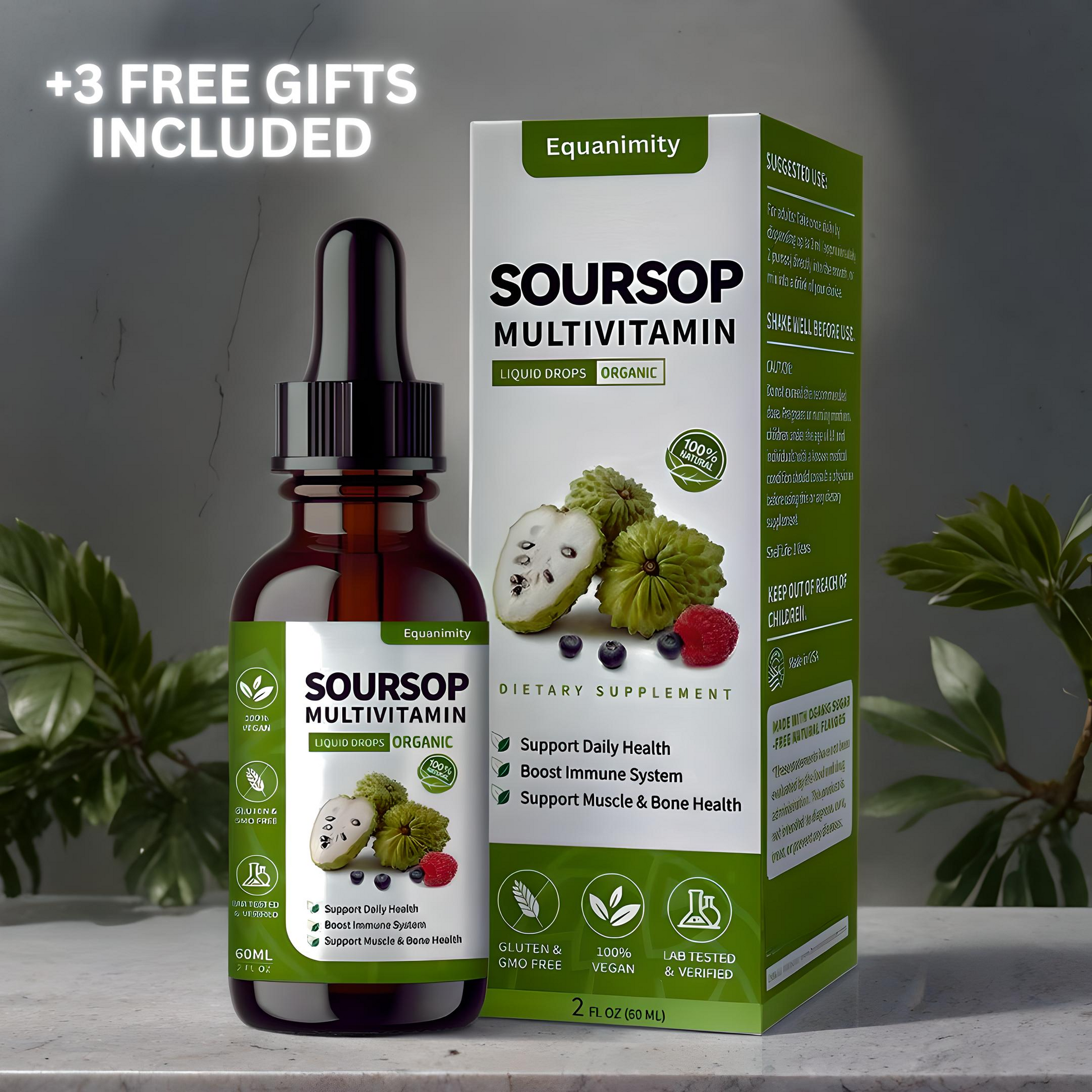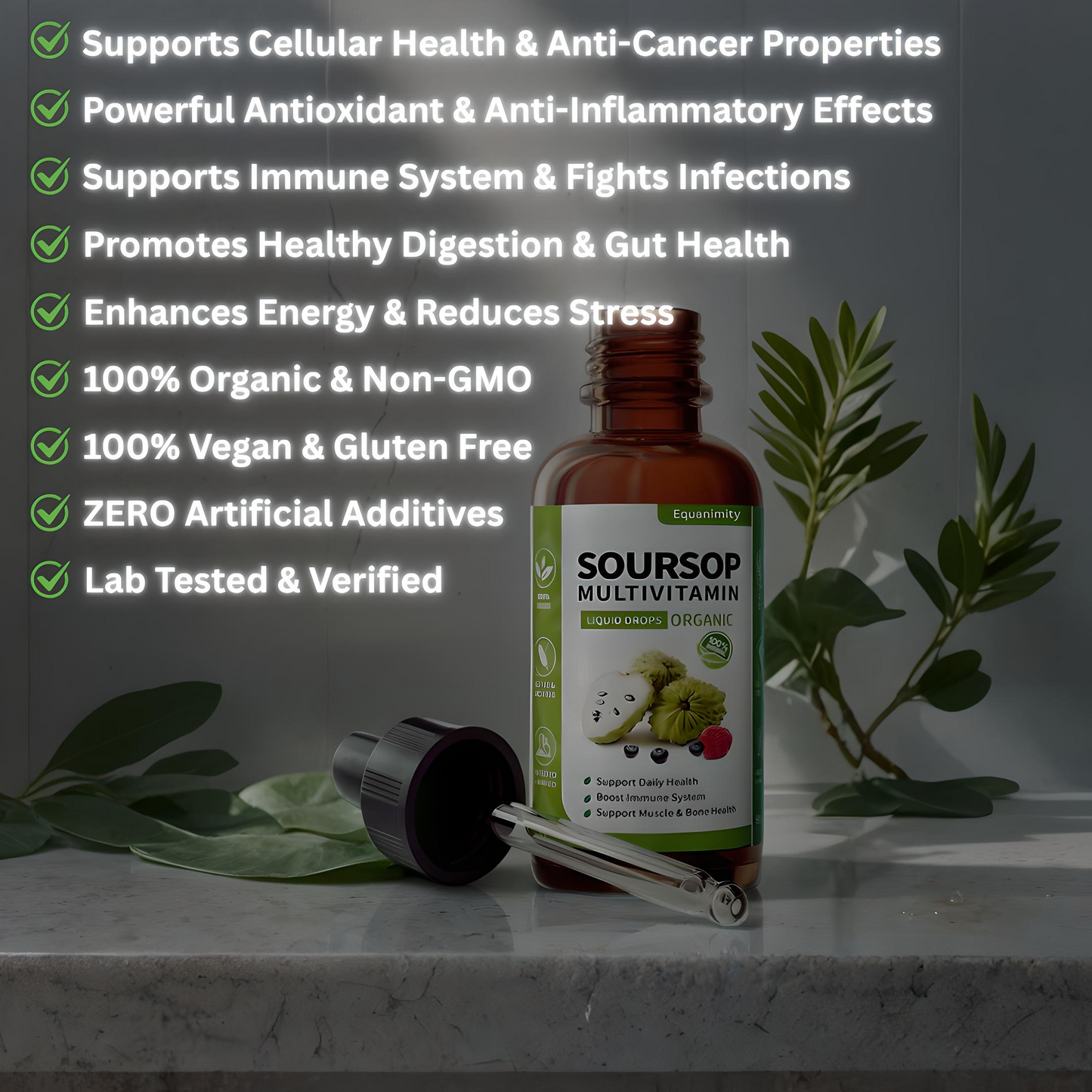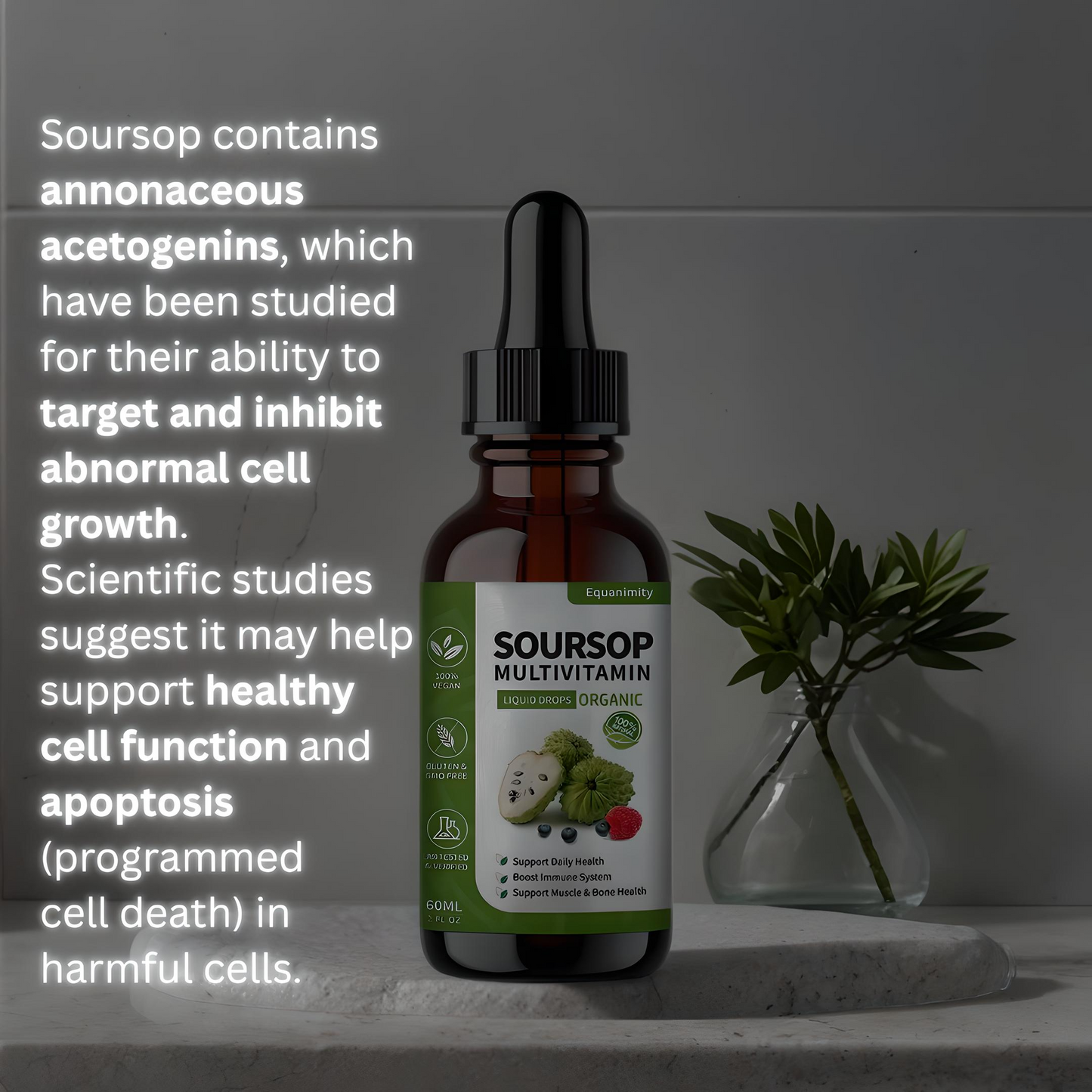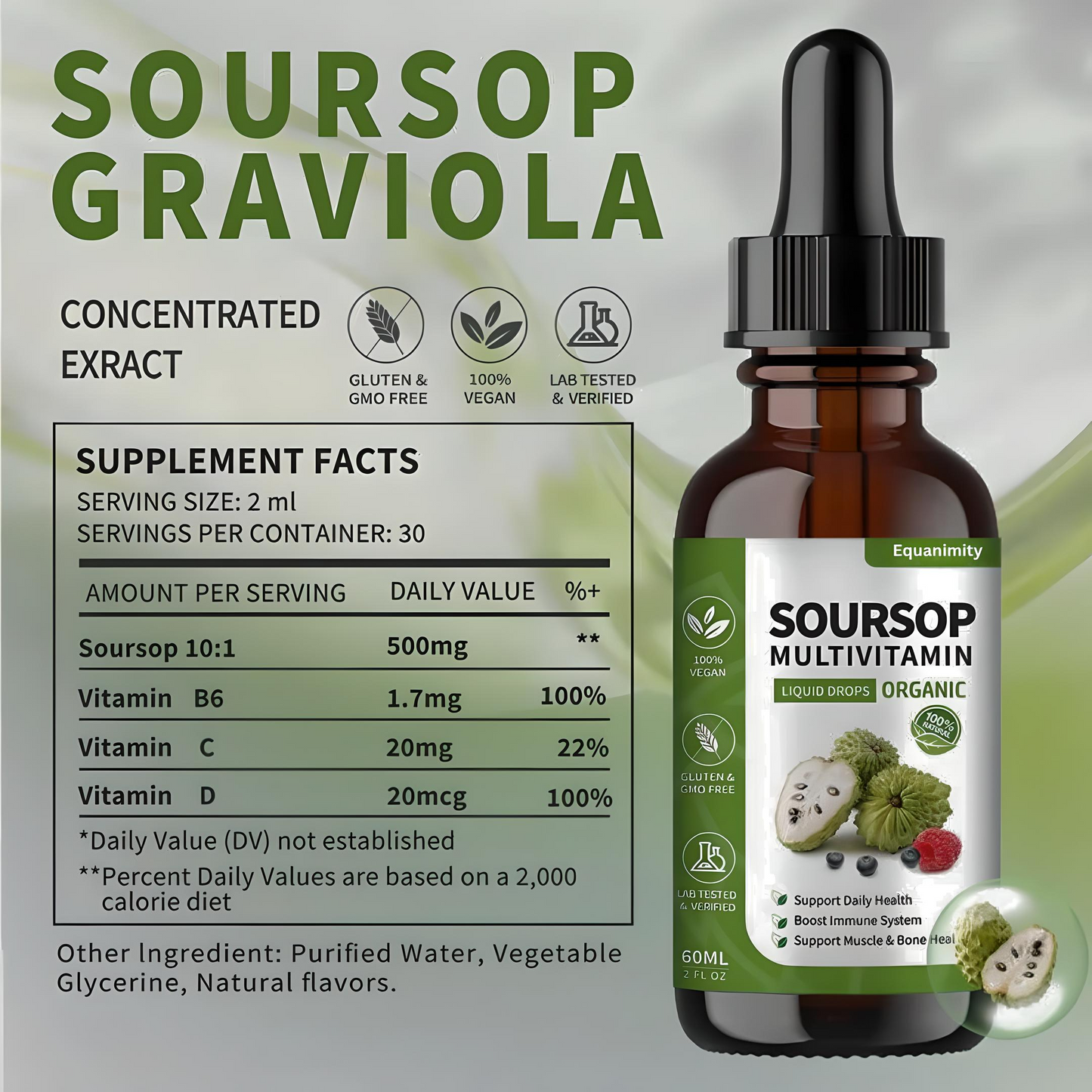Research Studies

Soursop contains many antioxidants, including phytosterols, tannins, and flavonoids. Antioxidants play a role in your overall health and may help protect against a variety of health conditions. (WebMD)
Soursop and immune health: Soursop is high in vitamin C, an antioxidant known to boost immune health and improve its ability to defend against pathogens. Vitamin C also promotes the destruction of free radicals, which can help protect your skin and cells from environmental oxidative damage. One soursop fruit contains about 129 milligrams of vitamin C, which is about 172% of the recommended daily allowance of vitamin C for women and 143% for men. (WebMD)
Digestive health: Fiber is vital for your digestive health and helps promote regularity and prevent issues such as constipation. The recommended daily allowance for fiber is about 14 grams for every 1,000 calories — which translates to about 25 grams per day for women and about 38 grams per day for men. One whole soursop fruit contains about 21 grams of fiber, which gets you close to that RDA. (WebMD)
Anticarcinogenic effects: In the future, soursop extract may be an alternative or complementary therapy to other cancer drugs, but we need more research. One systematic review showed that the extract of Annona muricata (scientific name of soursop) is full of bioactive compounds, including acetogenins, phenolic compounds, flavonoids, and alkaloids. Researchers say these compounds have the "ability to decrease the growth of cancer." (WebMD)
Inflammation: Antioxidants fight free radicals, reducing the damage to your cells caused by oxidative stress. One of the side effects of oxidative stress is inflammation. The antioxidants in soursop may, therefore, help reduce inflammation in the body. (WebMD)
Stabilize blood pressure: High blood pressure may lead to serious issues such as heart disease and heart attack. Sodium intake is a key factor leading to high blood pressure. Potassium helps your body get rid of sodium and eases the tension in the walls of your blood vessels, both of which can help lower your blood pressure. A whole soursop fruit offers approximately one-third to one-half of your recommended daily allowance of potassium. (WebMD)
Fight against bacteria: Soursop may provide antibacterial effects. One study found that an extract may be able to kill many different types of bacteria, including strains that cause gum disease and cavities. Another study found that soursop extracts may help fight cholera and staphylococcus bacteria. While these were test-tube studies, the results are promising, and further research is needed. (WebMD)
Lower blood sugar levels: Soursop extract has been shown to reduce blood sugar in several studies. In one study where diabetic mice received a daily dose of soursop extract for 28 days, the rats had reduced blood glucose levels. Results from a separate study on diabetic mice were equally promising. They showed that low doses of soursop extract lowered the mice's fasting blood glucose levels, HbA1c (a test that measures average blood sugar over the previous two to three months), insulin resistance, and hepatic lipid profiles. The mice also showed improvement in their insulin signaling. We still need more research to know how these results would translate to humans. (WebMD)
Treat ulcers: Soursop extract may show promise for treating gastric ulcers. A review of 49 research articles from 1981 to 2021 showed that soursop's high concentration of flavonoids, tannins, and phenolic acids made it a popular traditional medicine to treat gastrointestinal issues, including ulcers. One study using soursop leaves to treat ulcers in rats reduced the ulcers and suppressed gastric acid that can damage the mucus membrane lining the walls of the stomach, similar to proton pump inhibitors. But we still don't have enough research to know if this would be effective in humans. (WebMD)
Weight loss: In a study using adult mice, researchers test whether soursop extract could be used to treat some of the symptoms of obesity. The results showed that mice who were given a high-fat diet, and then supplemented with doses of 50 mg/kg and 100 mg/kg soursop extract had significant reduction in body weight compared to the mice that weren't given the extract, even though they didn't have a reduced caloric intake. The study authors said they believe it confirms soursop leaf tea can help reduce body weight, but should be studied further in humans. (WebMD)
The phytochemicals in soursop have made it a popular herbal treatment in traditional medicine for a long time. Its leaves been used to make tea to treat a wide range of health conditions and ailments, including: Bacterial or parasite infections, Fever, High blood sugar, High blood pressure, Inflammation, Anxiety, Cancer, Digestive problems, Pain, Cough, Asthma Headaches, Insomnia, Abscesses, Ulcers (WebMD)
People in Africa and South America use the bark, leaves, root, and fruits of the graviola tree to treat: infections with viruses or parasites, rheumatism, arthritis, depression, sickness. We know from research that some graviola extracts can help to treat these conditions. In laboratory studies, graviola extracts can kill some types of cancer cells including liver, breast and prostate cancer cells. (CancerResearchUK)
Many of the reported benefits of soursop are due to its high content of antioxidants. Antioxidants are compounds that help neutralize harmful compounds called free radicals, which can cause damage to cells. (Healthline)
Some research shows that antioxidants could play a role in reducing the risk of several diseases, including heart disease, cancer and diabetes (3 Trusted Source, 4 Trusted Source, 5 Trusted Source). One test-tube study looked at the antioxidant properties of soursop and found that it was able to effectively protect against damage caused by free radicals (6 Trusted Source). Another test-tube study measured the antioxidants in soursop extract and showed that it helped prevent damage to cells. It also contained several plant compounds that act as antioxidants, including luteolin, quercetin and tangeretin (7 Trusted Source). (Healthline)
Although most research is currently limited to test-tube studies, some studies have found that soursop could potentially help eliminate cancer cells. One test-tube study treated breast cancer cells with soursop extract. Interestingly enough, it was able to reduce tumor size, kill off cancer cells and enhance the activity of the immune system (8 Trusted Source).Another test-tube study looked at the effects of soursop extract on leukemia cells, which was found to stop the growth and formation of cancer cells (9 Trusted Source). (Healthline)
In addition to its antioxidant properties, some studies show that soursop may contain potent antibacterial properties as well. In one test-tube study, extracts of soursop with varying concentrations were used on different types of bacteria known to cause oral diseases. Soursop was able to effectively kill off multiple types of bacteria, including strains that cause gingivitis, tooth decay and yeast infections (10 Trusted Source). Another test-tube study showed that soursop extract worked against the bacteria responsible for cholera and Staphylococcus infections (11 Trusted Source). (Healthline)
Some studies have found that soursop and its components may be able to help fight inflammation. Inflammation is a normal immune response to injury, but increasing evidence shows that chronic inflammation could contribute to disease (12 Trusted Source). In one study, mice were treated with soursop extract, which was found to decrease swelling and alleviate inflammation (13 Trusted Source). Another study had similar findings, showing that soursop extract reduced swelling in mice by up to 37% (14 Trusted Source). In fact, in one animal study, soursop extract was found to decrease the levels of certain inflammatory markers involved in arthritis (15). (Healthline)
Soursop has been shown to help regulate blood sugar levels in some studies. In one study, diabetic mice were injected with soursop extract for two weeks. Those who received the extract had blood sugar levels that were five times lower than the untreated group (16 Trusted Source). Another study showed that administering soursop extract to diabetic mice reduced blood sugar levels by up to 75% (17 Trusted Source). (Healthline)
Antioxidant properties Antioxidants keep the body’s cells healthy by hunting disease-causing free radicals in the body and destroying them. According to a 2014 study, graviola extract has many compounds with antioxidant abilities. These include: tannins, saponins, phytosterols, flavonoids, anthraquinones. Antioxidants help people stay healthy overall. However, more research is necessary to determine if graviola’s antioxidants prevent specific diseases. (WebMD)
Anti-inflammatory properties According to a 2014 study Trusted Source on mice, graviola features anti-inflammatory properties that may relieve pain. The study’s researchers supported its use as a folk remedy for pain and inflammatory conditions. A 2010 rodent Trusted Source study found graviola blocked pain receptors and reduced inflammation in rats. (WebMD)
Helps lower blood sugar The results of a 2008 rodent study Trusted Source suggest graviola may help people regulate their blood sugar if they have diabetes. The research found that it significantly reduced blood glucose levels in rats with diabetes. In addition, despite the mice consuming less food and water, they did not lose weight. Researchers believe this may be the result of better glucose control. (WebMD)
Helps lower blood pressure People often use graviola as a folk remedy to lower blood pressure. Uncontrolled high blood pressure may increase the risk of heart disease, diabetes, and stroke. A 2012 study on rats found graviola helped reduce blood pressure without increasing heart rate. According to researchers, the herb’s hypotensive abilities are due to its effect on calcium ions. (WebMD)
Helps prevent ulcers Ulcers are painful sores that develop in the stomach lining, esophagus, or small intestine. According to a 2014 study Trusted Source on rodents, graviola showed antiulcer abilities. It also helps protect the stomach’s mucous lining and prevents free radical damage to the digestive tract. (WebMD)
Helps treat herpes Herpes is a viral infection that occurs due to the herpes simplex virus. It may appear on the genitals or mouth. Health experts consider graviola an alternative treatment for herpes, but the supporting evidence is still inconclusive. However, a 2012 study showed it had some antiherpes activity in the laboratory. Additionally, according to an older study from 1999 Trusted Source, graviola extract may have antiviral effects against herpes simplex 2 virus (HSV-2). HSV-2 is responsible for most cases of genital herpes outbreaks. Using an in vitro technique, or outside a living body, graviola was toxic to HSV-2 cells. (WebMD)
Anticancerous properties There is some evidence that graviola may help against some types of cancer. According to 2016 research Trusted Source, graviola extract was toxic against some breast cancer cell lines.It also increased T cells, which are lymphocytes in the body that kill cancer cells, and other damaged cells. A 2012 study Trusted Source found graviola may be beneficial against some pancreatic cancer cell lines by inhibiting cellular metabolism. (WebMD)
Scientists have studied graviola for many kinds of cancers. Findings from lab and animal studies have been encouraging. But they haven’t tested graviola on people to know if the results will hold up. (WebMD)
Breast cancer. In one study, graviola leaf extract shrank breast tumors in mice. Other studies looked at the effect of graviola fruit extract on a protein called epidermal growth factor receptor (EGFR). This protein sits on the surface of cells and helps them grow and divide. Some breast cancer cells have too much EGFR. The cells grow faster and are harder to treat. Graviola blocked the growth of these cells. Liver cancer. In several studies, graviola extract caused cell death in liver cancer cells. Lung cancer. Graviola leaf extract stopped the growth cycle of lung cancer cells. Pancreatic cancer. A powder of graviola leaves and stems caused cell death in pancreatic cancer cells. Graviola also blocked signaling pathways that help pancreatic tumors spread. Prostate cancer. In studies, graviola fruit pulp extract stopped prostate cancer cells from spreading. Colon cancer. One study found that an extract from graviola leaves killed colon cancer cells in the lab. Skin cancer. An extract from graviola leaves inhibited tumor growth in a study of mice with skin cancer. (WebMD)
Research also shows that soursop has natural cytotoxicity effects. For cancer patients, chemotherapy and radiation therapy are cytotoxic therapies (meaning they kill cancer cells). The fruit also has an ability to reduce the cell growth on a number of cancer cell lines, including breast, lung, pancreatic, prostate, ovarian, and colorectal cancers. (VeryWellHealth)
Breast Cancer In the United States, breast cancer is known as the most frequently diagnosed cancer (apart from skin cancer) and is the second-leading cause of cancer deaths in women. In a study in mice, researchers found that the leaves from soursop showed an anticancer effect on breast cancer cell lines. Studies have also shown that extracts from soursop can aid in destroying cells that are resistant to specific chemotherapy drugs. (VeryWellHealth)
Prostate Cancer Prostate cancer is the second-leading cause of cancer death in men. A recent study showed that soursop has an anticancer effect on prostate cancer cells in mice. Colorectal cancer is now the second-leading cause of cancer-related deaths overall. The leaf extract of soursop has showed anticancer properties against a cell line, restricting of migration, and cytotoxicity against certain cells. (VeryWellHealth)
Pancreatic Cancer Pancreatic cancer is expected to be the third-leading cause of cancer-related deaths in 2023. Studies show that pancreatic tumors are resistant to conventional chemotherapies and radiotherapies. Many diagnoses are already in the advanced stages because the disease often presents with no specific early clinical symptoms. Research studies have reported soursop extract shows promise for pancreatic cancer therapeutics due to its anti-tumor characteristics. (VeryWellHealth)
Has Been Shown To Control Blood Sugar Soursop may help manage blood sugar, but research is limited. One study conducted in vitro (in a lab) found that extracts of the fruit inhibit enzymes that help break down carbohydrates into glucose (sugar). This action can slow down how quickly your body absorbs glucose, which may help lower high blood sugar levels. More human research is needed to confirm this benefit. (Health)
Helps Reduce Inflammation Soursop is a rich source of vitamin C, with 46.4 milligrams per 1 cup. Diets high in vitamin C have been shown to reduce inflammation. Soursop may be especially helpful for people with inflammatory conditions like arthritis and inflammatory bowel disease (IBD). (Health)
May Have Antibacterial Properties Research has shown that soursop may be able to get rid of harmful bacteria. One study conducted in vitro found that soursop leaf extract was effective against Streptococcus (strep) bacteria in oral infections. More human studies are needed to confirm the antibacterial properties of soursop. (Health)
May Lower Blood Pressure Soursop contains a variety of bioactive compounds that may lower blood pressure. Some evidence suggests that these compounds inhibit an enzyme called angiotensin-I-converting enzyme (ACE), which regulates blood pressure levels. One study of 143 people with borderline hypertension (high blood pressure) found that treatment with 7 ounces of soursop fruit juice daily for three months lowered blood pressure levels compared with a control group. Adding soursop products to your diet may help reduce blood pressure levels and protect against high blood pressure. Research investigating soursop's potential blood pressure-lowering effects is limited. More studies are needed to understand its role in blood pressure management. (Health)
Might Kill Cancer Cells Soursop is concentrated in acetogenins, which some evidence suggests have strong anticancer effects. This fruit is also rich in alkaloids and flavonoids, both of which may have anticancer and antioxidant properties. One review noted that animal and in vitro studies have shown that soursop extract helped target cancer cells. More human research is needed to fully understand how soursop can affect cancer treatment. (Health)
Rich in Antioxidants Soursop is a rich source of antioxidants that may benefit overall health. Antioxidants protect cells from damage caused by free radicals. When free radicals overwhelm your body's defenses, it results in oxidative stress that increases the risk of aging and disease. Antioxidants neutralize free radicals and reduce damage to lipids, proteins, and DNA. Soursop contains protective plant compounds such as sesquiterpenes, phenolic compounds, acetogenins, and alkaloids. Phenolic compounds like coumaric acid are powerful antioxidants. (Health)
Supports Digestive Health Soursop is high in fiber, which is important for digestive health. A 1-cup serving of raw soursop provides 7.42 grams of fiber, which covers 26.5% of your daily fiber needs. The fruit contains both insoluble and soluble fiber. Insoluble fiber, which passes through your gut intact, adds bulk to stools to regulate bowel movements. Soluble fiber draws water into your stools, which makes them easier and more comfortable to pass. Diets high in fiber can protect against several diseases, including gastrointestinal cancers. One review found that high fiber intake reduces the risk of stomach and colorectal cancer. (Health)
Rated 4.9/5 by 3,000+ Reviews ✨
Hear what our customer are saying about our Soursop Extract

Ultra-Potent Organic Soursop Extract
- 🧬 Support immune function
- 🦠 Provide antioxidant protection
- 🍋🟩 Promote healthy digestion
- ⚡️ Support energy levels & stress
- 💚 Maintain overall wellness & vitality








- Choosing a selection results in a full page refresh.
- Opens in a new window.






